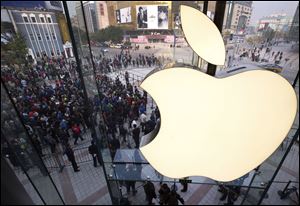
Apple antitrust suit over e-books set for NY trial
6/2/2013
In a civil case where the words of Steve Jobs play prominently, the government and Apple Inc. are set to square off over allegations that Apple Inc. conspired with the country’s largest book publishers to make consumers pay more for electronic books. U.S. District Judge Denise Cote is scheduled to begin hearing the price-fixing case today in federal court in Manhattan.
NEW YORK — In a civil case where the words of Steve Jobs play prominently, the government and Apple Inc. are set to square off over allegations that Apple Inc. conspired with the country’s largest book publishers to make consumers pay more for electronic books.
U.S. District Judge Denise Cote is scheduled to begin hearing the price-fixing case today in federal court in Manhattan.
The trial stems from an antitrust lawsuit brought last year by the Justice Department, which accused Apple of helping hatch the scheme at a meeting with publishers in 2009 as it was preparing to launch the iPad. Its purpose was to force Seattle-based Amazon.com — the marketer of Kindle e-book readers — to raise the $9.99 price it had set for the most popular e-book titles because that was substantially below their hardcover prices, the government says.
“Apple wanted to sell e-books to the public, but did not want to compete against the low prices Amazon was setting,” the government wrote in its court papers. “Apple knew that the major publishers also disliked Amazon’s low prices and saw Apple’s potential entry as a pathway to higher retail prices industrywide.”
The Justice Department accuses the conspirators of agreeing that instead of selling books to retailers and letting them decide what price to charge readers, the publishers would convert the retailers into “agents” who were restricted from lowering the publisher-set retail price. The arrangement guaranteed Apple a 30 percent commission on each e-book it sold.
The government has alleged that the scheme cost consumers tens of millions of dollars by adding $2 or $3, sometimes as much as $5, to the price of each e-book. It also argues part of the proof is Jobs’ own account of the arrangement.
The former Apple CEO “conceded the price-fixing conspiracy when, the day after publicly announcing Apple’s forthcoming iBookstore, he explained to his authorized biographer that Apple had told the publishers, ‘We’ll go to the agency model, where you set the price, and we get our 30 percent, and yes, the customer pays a little more, but that’s what you want anyway,’” the government says in court papers.
In its papers, lawyers for Apple have accused the government of basing its case “on mere allegations, faulty assumptions and unfounded conclusions.” The Cupertino, Calif.-based company has denied claims that its agreements required publishers to force Amazon to charge more for e-books.
The agreements “required no such thing,” the defense papers say. “They set forth the terms of Apple’s business relationship with each publisher; they placed no constraints on how a publisher should deal with other retailers, including Amazon.”
The government has reached settlements with the five publishers named in the suit — Hachette, HarperCollins, Simon & Schuster, Holtzbrinck Publishers, doing business as Macmillan, and The Penguin Publishing Co. Ltd., doing business as Penguin Group — that requires them to lift restrictions on discounting and other promotions they had imposed on e-book retailers. The judge has urged Apple to settle, even suggesting at a recent pretrial hearing that its chances of prevailing at trial are slim.
“I believe that the government will be able to show at trial direct evidence that Apple knowingly participated in and facilitated a conspiracy to raise prices of e-books, and that the circumstantial evidence in this case, including the terms of the agreements, will confirm that,” she said.
On May 22, British publisher Pearson’s Penguin unit announced it would pay $75 million in damages plus costs to settle claims by 33 attorneys general of 33 states and a class-action lawsuit by consumers alleging price-fixing in the e-book market.